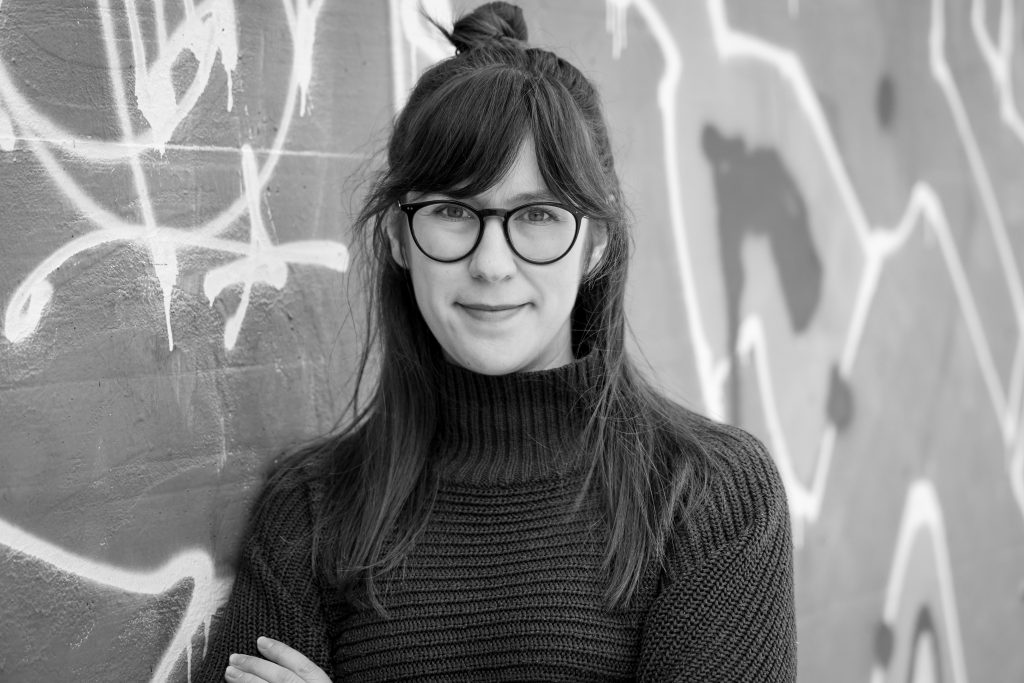
contact
Eberhard Karls Universität Tübingen
GRK Doing Transitions
Institut für Erziehungswissenschaft
Abteilung Allgemeine Pädagogik
Münzgasse 26, R 202
D – 72070 Tübingen
0049 7071/29-76752
flora.petrik(at)uni-tuebingen.de
Flora Petrik works as a research associate and lecturer at the Department of Foundations of Education at the Institute for Education, University of Tübingen. She studied Education Studies, German Studies and Comparative Literature in Vienna and Jyväskylä and has been an associate member of the DFG graduate program “Doing Transitions” since January 2020. From September 2024, she will be coordinating the Exploration Fund-funded project “Ambivalent educational advancement – interdisciplinary approaches” (duration: 2024-2026).
In her PhD-project, she explores the experiences of working-class students in Austrian and German Higher Education and shifts the perspective to the potentially empowering spaces at university. Her areas of focus in research and teaching include social inequality in schools and universities, qualitative methods; social class and Bourdieu’s theory of practice as well as epistemological and methodological issues.
Flora Petrik is currently co-leader of the research collective “Ethnographic Collage” and co-convenor of the Bourdieu Study Group of the BSA (British Sociological Association). She is a regular reviewer for academic journals, including BIOS: Journal of Biographical Research and Oral History, Critical Studies in Education and Sociology of Education.
Research Project
Becoming Academic
First-Generation Students in Austrian and German Higher Education
In recent years, educational research has illustrated how persistent social structures are: Social background has a decisive influence on study experiences, life trajectories and regulates transitions within the education system. Especially studies on higher education have shown that one’s social class is not neutralised by entering university but rather stays persistent throughout students’ educational careers. The equal distribution of opportunities remains an »illusion«, as Pierre Bourdieu and Jean-Claude Passeron have already noted in the 1960s.
In my dissertation project, I explore a subject matter that has been gaining increasing attention during the past years: Upward mobility. I place the experiences of those who escape their supposedly predetermined fate and transgress the persistent class barriers at the centre of attention. The aim of my PhD project is to examine biographical transformations of first-generation students at university. Thus, the research project is interested in linked transitions, in particular how biographical and class transitions relate to one another. How are transitions to and in higher education shaped, produced and experienced? How is a sense of belonging constructed in the field of university? Which arrangements of time, space, actors, and practices frame and navigate upward mobility in education? Which spaces of possibility for habitual transformation open up in the process?
Drawing on case studies of 24 first-generation students across higher education institutions in Austria and Germany, the project attempts to understand the complexity of climbing up the educational ladder and examines both the normalising and empowering dimensions of upward mobility. Collecting different biographical data (biographical-narrative interviews, diary entries, autobiographical documents of one’s educational path), allows to explore the powerful interrelatedness of discourses, institutions, and individuals. Transitioning to university hence appears as a non-linear, conflicting process of becoming.
Key Publications
- Lütgens, J. & Petrik, F. (2024). Left-wing educational climbers: On the interplay of political socialisation, educational aspirations and emotions. In: Society – Individual – Socialisation. Journal for Socialisation Research, 5(1) (published in German)
- Lütgens, J., Petrik, F. & Brehm, A. (Ed.) (2024). “Once more, with feeling”: (Anti-)emancipatory transformation potential of feelings. Special Issue. In: Society – Individual – Socialisation. Journal for Socialisation Research, 5(1) (published in German)
- Ruff, M.-B. & Petrik, F. (2024). The Quiet Power of Shame: Racism, Social Class and the (Re-)Production of Social Inequality. Journal of Psychology, 32(1):10-30 (published in German)
- Buchner, T. & Petrik, F. (2023). Evaluating education policies through a spatial lens. Uncovering the ability-space-regimes of Austrian new middle schools. In: Rißler, G./Köpfer, A./Buchner, T. (Hrsg.): Space, Education, and Inclusion. Interdisciplinary Approaches. London: Routledge, pp. 38-56.
- Rieger-Ladich, M., Feldmann, M. & Petrik, F. (2022). Contested Remembrance: The “Old” Federal Republic and “New” Right Politics in Germany. In Goto, M./Wigger, L. (Eds.), Remembrance – Responsibility – Reconciliation. Challenges for Education in Germany and Japan. Metzler, pp. 31-44.
Conference Presentations (selection)
- 06/2024: No Way Home? The experience of homecoming between social and spatial mobility. Third International Conference of the journal “Scuola Democratica”, University of Cagliari (with Alessandra Polidori and Giulia Salzano)
- 06/2024: Promising Young Academics: Social Magic In Academic Mentoring And The Role Of Social Class. Third International Conference of the journal “Scuola Democratica”, University of Cagliari (with Maria Keil)
- 03/2024: Broken Promises? Biographical perspectives on Social Mobility and Education. Presentation for the research group “Cultura cívica y políticas educativas”, 15th of March 2024, Universidad Complutense de Madrid (invitation)
- 02/2024: Between resistance and belonging: class experiences in Higher Education. Presentation within the seminar series of GEPS, 23th of February 2024, Universitat Autònoma de Barcelona (invitation)
- 01/2024: Shattered Promises – Exploring Social Mobility and Inequality in the Educational Journeys of Contemporary Youth. Workshop Study Day “Youth between strategies and crises”, 11.-12.01.2024, EHESS, Paris.
- 12/2023: Boundary-making Practices in Scientific Fields – the Case of Linking Ages. Workshop “Paradigms, Networks, and Careers – Comparative Analysis of Scientific Fields”, 7.-8.12.2023, Universität Magdeburg (with Milena Feldmann and Anna Wanka).
Memberships
- German Educational Research Association (GERA), research networks »Philosophy of Education«, »Biographical Research in Education« and »Gender Studies and Education«
- PhD network »Qualitative Educational and Biographical Research« of GERA
- German Association for Sociology (DGS), research networks »Education« and »Biography«
- Goethe Research Academy for Early Career Researchers (GRADE)
- British Sociological Association (BSA), Bourdieu Study Group (Co-Convenor since 11/2022)
